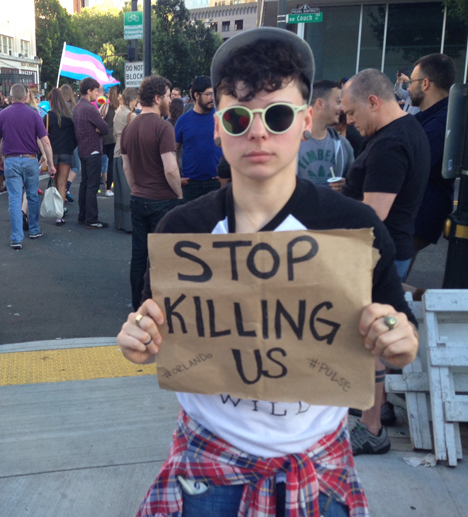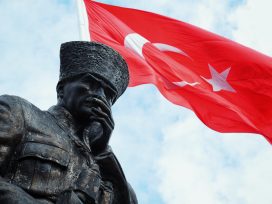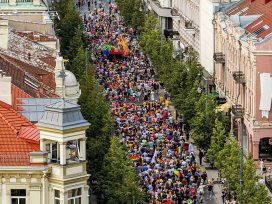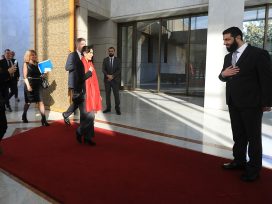Less than 24 hours after committing the worst mass shooting in US history, Omar Mateen’s narrative was crystallising along two contradictory but familiar lines. On the one hand, the man who murdered 49 people at Orlando LGBT club Pulse was seen as a typical radical Islamist terrorist – despite the secular American life he had apparently led, and the absence of any links to ISIS beyond his own declaration of “allegiance”. In parallel, and despite this ostensibly cancelling out the first narrative, Mateen was also stereotyped as a self-hating closet case.

Vigil for Orlando Pulse Shooting victims. Hundreds of people gathered outside Embers nightclub in downtown Portland to mourn the terrorist attack at Pulse in Orlando, Florida and call for LGBT acceptance and tighter gun control, 12 June 2016. Photo: Sarah Mirk. Source:Flickr
One of the first proponents of this idea was Mateen’s ex-wife, Sitora Yusufiy. “If you know anything about psychology, you know that people that have a really, really strong resentment or above-average hate toward something, it’s because deep inside that’s what they truly are,” she told the New York Times the day after the massacre at Pulse. Neither this speculation nor the cod-psychological, faux-expert terms in which it was relayed was a surprise, nor was Yusufiy’s admission in the same interview that she had no concrete evidence of Mateen’s supposed homosexuality. The suggestion that the worst perpetrators of homophobia are secretly gay themselves is inevitable and intertwined with the acts themselves; a slur routinely aimed at conservative politicians, fundamentalist preachers and macho posturers, and a punchline – to the extent that “Top five homophobes who turned out to be gay” has become a popular listicle formula online. This is sometimes presented as a defence of LGBT rights, but it’s a mistaken tactic that ultimately nourishes homophobia itself.
Sure, there are indeed scientific studies that claim to have established a correlation between homosexual arousal and homophobic beliefs; one of the latest was the University of Rochester’s April 2012 paper “Is some homophobia self-phobia?” is notion was trumpeted across conservative and liberal media alike, including both straight and gay outlets. Less remarked upon were the links between homophobia and mental health, culture and family upbringing also explored in the study. Of the various factors that might affect homophobia, it seems this holds more fascination than any other; its power as a cultural narrative seems hugely disproportionate relative to scientists’ cautious explorations into potential connections that have actually proven little, and certainly nothing like the blanket rule that Yusufiy imagines to exist.
While it’s a means of belittling the homophobe that works on a number of levels, none of these support either the rights or the humanity of LGBT people. “You’re gay!” is an accusation we hear countless times growing up, and whether it’s malicious or casual, each iteration is yet another reason to step further back into the closet, to form another protective layer of lies between us and the world. To hear it repurposed in this context is merely to hear those same words deployed, once again, because they’re the ones that will hurt the target the most. If the homophobe is perceived as seeking to impose patriarchal control, flinging gayness back at him is a means of weakening him; if it derives from an attempt to bolster his manliness, the words “You’re gay!” imply a diminution of masculinity.
The closet case, meanwhile, is cast as a moral failure, as an embodiment of cowardice and weakness. But if the implied contrast is with the bravery of out members of the LGBT community, it’s a line of thinking that displays a fundamental lack of understanding of their experience. Fear and self-loathing are not confined to violent closet cases and they are not responsible for
homophobic aggression; they are integral to the lives of LGBT people as
the consequences of living in a society
where homophobia runs deeper than anyone can hide their sexuality.
But it’s easier to focus on individual failure of character rather than on the social context that might encourage genuine self-reflection among straight people. The closet is indeed a toxic place to be, but the toxicity doesn’t originate from those trapped there. It’s a structure built around us and the arduous, intensely personal process of escaping it is dependent less on strength of character and more on circumstances that are created by straight society. Your family, your religion or beliefs, your geographic location, your social circle, your school, your occupation: all of these play greater roles in an LGBT individual’s ability and willingness to come out than moral fibre. As a side note, this is also why outing anyone in the closet, whether for ostensible political purposes or for tabloid titillation, is such a reprehensible tactic.
Self-loathing doesn’t arise in a vacuum for LGBT people; it piles up inch by inch every time homosexuality is used as an insult or a punchline. And, as with any other form of identity-based prejudice, it’s imperative to realise how little intent matters: a clumsily expressed joke born out of ignorance or herd mentality can be as damaging as active institutional oppression or explicit hatred. To criticise someone for remaining in the closet without questioning exactly how the closet is constructed in the first place is the height of hypocrisy.
The assumption that self-loathing is at the root of homophobic acts is also a convenient absolution for straight people. It shouldn’t feel necessary to state this, but heterosexuals are more than capable of inflicting anti-gay damage in word or deed without it stemming from any secret desires: they created the social structure in which homophobia thrives, after all. Indeed, one such example may turn out to be Omar Mateen. In the wake of Yusufiy’s speculation, plenty more “evidence” was reported to support the theory that Mateen was gay: an alleged male lover, an alleged presence on a gay dating app, a sighting at Pulse itself. Each of these pieces of the puzzle was emblazoned across the mainstream media; thinkpieces proliferated about Mateen’s sexuality (none of which, incidentally, even considered bisexuality as a possibility: a narrative that insults homosexuals and erases bisexuals). Spanish-language media outlets even ran an apparent text message to Mateen’s wife explicitly stating his homosexuality – which, it later emerged, originated on a hoax website.
Less widely reported was the FBI’s announcement, two weeks after the Pulse massacre, that in their extensive trawl through Mateen’s hard drives and online activity, as well as an investigation carried out by the dating app Adam4Adam, they had discovered no evidence whatsoever that Mateen was gay, secretly or otherwise.
What is terrifying about an attack such as the Pulse massacre isn’t that Mateen is an exceptional case or even particularly hard to understand. The conversion of hateful thoughts and words into murderous actions is thankfully rare – but the hateful thoughts, sentiments and opinions themselves are quotidian stuff. Is forensically trawling through Mateen’s psyche to determine his precise motivation really a necessity in preventing another Mateen emerging – or is the desire to apportion blame just a means for heterosexual society to absolve itself once again, to avoid thinking too hard about the homophobia so deeply entrenched within it?
Mateen targeting LGBT victims has been used to exculpate Western society on two fronts: as a radical Islamist waging war on tolerance and diversity and as a closet case whose actions were rooted in his inability to overcome self-hatred. Either way, homophobia is classed as other: an illiberal force from outside our society, or a twisted psychological seed from within an evil individual. But homophobia is a pervasive force in everyday life. Sometimes it takes the form of a bad joke; sometimes it takes the form of malicious words; and sometimes it takes the form of a murderous rampage. The root remains the same.







